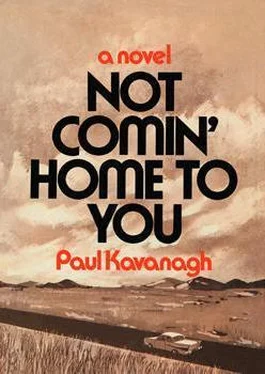Paul Kavanagh - Not Comin' Home to You
Здесь есть возможность читать онлайн «Paul Kavanagh - Not Comin' Home to You» весь текст электронной книги совершенно бесплатно (целиком полную версию без сокращений). В некоторых случаях можно слушать аудио, скачать через торрент в формате fb2 и присутствует краткое содержание. Город: New York, Год выпуска: 1974, ISBN: 1974, Издательство: G.P. Putnam's Sons, Жанр: Криминальный детектив, на английском языке. Описание произведения, (предисловие) а так же отзывы посетителей доступны на портале библиотеки ЛибКат.
- Название:Not Comin' Home to You
- Автор:
- Издательство:G.P. Putnam's Sons
- Жанр:
- Год:1974
- Город:New York
- ISBN:978-0-399-11357-4
- Рейтинг книги:3 / 5. Голосов: 1
-
Избранное:Добавить в избранное
- Отзывы:
-
Ваша оценка:
- 60
- 1
- 2
- 3
- 4
- 5
Not Comin' Home to You: краткое содержание, описание и аннотация
Предлагаем к чтению аннотацию, описание, краткое содержание или предисловие (зависит от того, что написал сам автор книги «Not Comin' Home to You»). Если вы не нашли необходимую информацию о книге — напишите в комментариях, мы постараемся отыскать её.
Not Comin' Home to You — читать онлайн бесплатно полную книгу (весь текст) целиком
Ниже представлен текст книги, разбитый по страницам. Система сохранения места последней прочитанной страницы, позволяет с удобством читать онлайн бесплатно книгу «Not Comin' Home to You», без необходимости каждый раз заново искать на чём Вы остановились. Поставьте закладку, и сможете в любой момент перейти на страницу, на которой закончили чтение.
Интервал:
Закладка:
He had paid cash for the first tank of gas. And that, he’d since decided, had been a mistake. Old Walker P. Ferris might have had half the money in Texas, but you wouldn’t know it from the amount he’d been carrying. Eighty-three dollars and a handful of quarters and dimes, and that wasn’t enough to fill the Toronado’s big old tank too many times.
Credit cards, though, would keep it full forever.
Of course the cards took a little thinking about. Sooner or later they’d turn up Ferris, whatever the buzzards left of him, and figure out who he was. And sooner or later it would occur to some brilliant peace officer to wonder where old Walker’s car had gone to after Walker had quit traveling in it. A batch of credit card slips scattered over a batch of states would point that out pretty accurately.
But that would take its own sweet time to happen. The boys who sold him gas would just pop those slips in the box without a second look, and then they would send them on to the card companies, and it wouldn’t be until the bills went out to Walker P. Ferris himself that anything would show up. And that would be weeks or months, and by that time he’d surely be shut of the car and off in a different direction altogether, so what was the point of worrying about it?
He hadn’t even bothered practicing the signature. He just studied it for a time, and while he drove he played at picturing the signature in his mind, picturing too the way his hand would move to write the name just as Ferris had written it. And that was better than practice. It was actually doing the thing when you could make it happen that way in your mind ahead of time. Same as the move he had made on Walker, ducking and pivoting and grabbing for the wheel and hitting Walker upside the head all at once, and it came so easy because it had all been rehearsed, not just the what of it, the act, but the whole feeling and internal sensation of it.
He sauntered over to the car while the Indian kid finished wiping the windshield. He gave him the plastic card and leaned up against the front fender, waiting. When the kid went into the office he experienced a sudden unexpected rush of nervousness, but he guessed almost at once what it was all about. The boy was out of sight, that was all, and people became more of a threat when you couldn’t keep an eye on them.
He was never afraid of anything he could meet eye-to-eye.
And when the boy came back and presented him with a little plastic tray with a slip clipped to it, he signed next to the X without a bit of hesitation. And wrote Walker P. Ferris as well as Ferris himself had ever done. And gave back the pen and accepted the card and the receipt and drove off.
The tapes were all the same, strings and muted woodwinds, music to suck eggs by. He played the radio as he drove but kept switching stations because he couldn’t find the kind of music he wanted to hear. He picked up a wide variety of stations, country music and rock and classical, but whatever he picked up turned out to be something he didn’t want to listen to. He couldn’t define just what would sound good to him just then, but no more could he find it on the radio.
He hit a newscast once and stayed with it all the way through, waiting for an item about Ferris even though he knew there could not possibly be one. There had to be more men killed each day in Texas than the radio stations had time to tell you about, particularly radio stations in Oklahoma that wouldn’t likely be that interested in dead men turning up in Texas pastures.
Of course he’d left the corpse jaybird naked, which might give it a little more in the way of news value. How often did they find a naked man with his head bashed in in the middle of nowhere? Damn, he thought, that was an intriguing question, and he had no idea at all of the answer. Ten times a day or once a year or anywhere in between, as far as he had any way of knowing.
He had never killed a man before.
He thought about it and wondered how true it was. When you tended to move around a lot it was hard to be sure whether you’d left a man dead or not. A couple of times he had had to cut somebody or other, and having done so he had had to get the hell out, and two men at least had taken cuts that might have bought farms for them. And when you hit a man over the head and grabbed his roll and took off down the street, you never did know if maybe you’d hit him harder than you might have meant.
And there had been times, too, when a couple of hours had gone by and he’d emerged later on with no clear notion of just what had happened in the course of them. When you had a lot of speed in you and tried to come down with booze and reds, sometimes your mind had an anxious trick of slipping back on itself and coming at you on the blind side, and you would wash out a chunk of your memory as clean as a peeled egg, and what you did then you never would recall. Sometimes such moments seemed to come back in dreams, and he would claw his way out of sleep trying to snatch the dream out of the air and hang onto it, but you’d as well grab smoke.
He didn’t like those lost hours. Lately he had learned to avoid them. You had to take the speed edge off slowly, carefully, with a little wine or cough syrup and a couple of reds, and as soon as you had turned up into down you had to crash, had to get quickly into a bed and under the black hood of sleep. It was fighting the reds that wrecked you, because if you tried to operate under the Seconal instead of letting it take you out, then your body kept working and your brain went into another room and your memory was like a tape recorder with the microphone unplugged; the wheels went around but nothing was registered. Whenever he awakened to a memory lapse he left whatever town he was in, because there might be a reason he had to leave, and that possibility was always reason enough.
His long-term memory was spotty and unreliable, but this did not much trouble him. When you moved around a lot, when you never took time to put roots down, it was only natural that you didn’t clearly recall what month or what year, what town or what women or how they all fit together. And if you stayed in front of things and on top of things, if you put both feet in the present instead of living in the past and dreaming on the future, you couldn’t waste time remembering things that had no importance for you. You’d be wasting part of your mind, a part that could better occupy itself with more important things.
Like the fact that he had killed a man and left him naked in a cornfield. Correction — a pasture. His mind kept wanting to call it a cornfield because it sounded better, but facts were facts and brush and dry grass was all that field had held.
He had killed a man, for the first time that he could swear to, and now he was trying to decide how he felt about it.
The sky was red to his left when he saw the deer. Red and gold, with the sun dropping just a little below the dark-blue sun visor, and he was still on 281 and still in Oklahoma when damn if there wasn’t a big buck deer standing smack in the middle of his lane. He hadn’t seen that deer come out. It was just nowhere at all one second and in front of him the next, and he didn’t panic or sweat, just held onto the wheel and put the brake pedal on the floor.
The big car fishtailed a little and stopped fast enough so that he felt the pressure of the seat belt against his middle, and of course there was no goddamned deer at all, nothing in front of him but blacktop, and thank God nothing behind him because anybody tailgating him would have run halfway up his ass the way he stopped that thing.
No deer at all. No deer now and no deer in the first place, and he got off the brake and onto the accelerator and coaxed the Toronado back up to a nice steady sixty miles an hour.
Читать дальшеИнтервал:
Закладка:
Похожие книги на «Not Comin' Home to You»
Представляем Вашему вниманию похожие книги на «Not Comin' Home to You» списком для выбора. Мы отобрали схожую по названию и смыслу литературу в надежде предоставить читателям больше вариантов отыскать новые, интересные, ещё непрочитанные произведения.
Обсуждение, отзывы о книге «Not Comin' Home to You» и просто собственные мнения читателей. Оставьте ваши комментарии, напишите, что Вы думаете о произведении, его смысле или главных героях. Укажите что конкретно понравилось, а что нет, и почему Вы так считаете.












